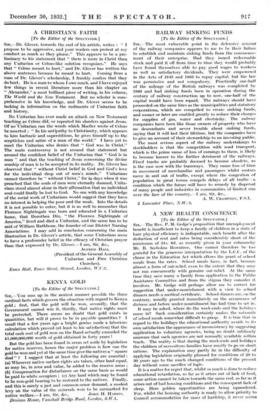RAILWAY SINKING FUNDS
[To the Editor of the SPECTATOR.] SIR,—The most vulnerable point in the defensive armour of the railway companies appears to me to be their failure to establish and maintain sinking funds from the commence- ment of their enterprise. Had they issued redeemable stock and paid it off from time to time they would probably have found themselves able to pay good wages to workers as well as satisfactory dividends. They were empowered in the Acts of 1845 and 1868 to repay capital, but the law was permisiiVe and not • compulsory. Practically one-hilf of the mileage of the British railways was completed by 1860 and had sinking funds been in operation during the century of railway construction up to now, one-half of the capital 'Would have been repaid. The railways should have proceeded on the same lines as the municipalities and statutory corporations, which are compelled to create sinking funds, and sooner or later are enabled greatly to reduce their charges for supplies of gas, water and electricity. The railway companies have been like those owners of property who have no descendants and never trouble about sinking funds, saying that it will last, their lifetime, but the 'companies have to give an account of their stewardship to an investing public.
The most serious aspect of the railway undertakings to stockholders is that the competition with road- transport, which is the prime cause of loss of earnings to them, is likely to become keener to the further detriment of the railways. Fixed tracks are probably doomed to become obsolete, as is the ease now with the tramways. They cause loss of time in movement of merchandise and passengers whilst motors move in and out of traffic, except where the congestion of population in great towns compels delays of all traffic—a condition which the future will have to remedy by dispersal of many people and industries in communities of limited size over the face of the country.— I am, Sir, &e., A. W. CRAMPTON, F.S. T.
2 Lancaster Place, N.W. 3.






























 Previous page
Previous page